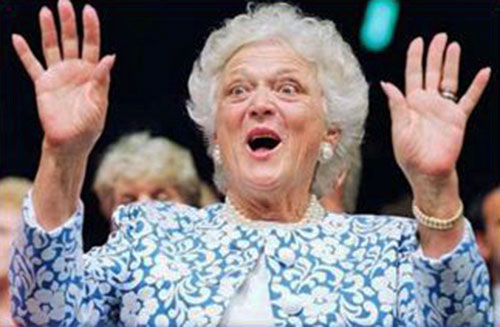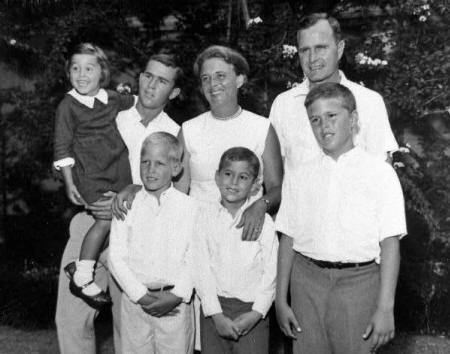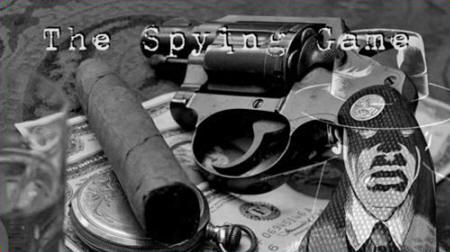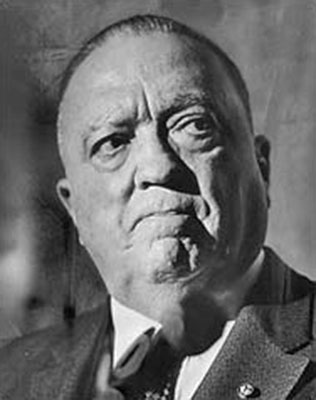|
Barbara’s Hair-Raising Day October 9, 2013
The trick is to quickly acknowledge and gain
control of the new material, mitigating the damage by redirecting it in a
beneficial way. This is known in tradecraft as "block and bridge."
Deep in that book, mostly a compendium of narrow-gauge, self-serving recollections, there it was:
The letter has plenty of details, but it omits one important personal item from that day:
Barbara begins to describe that fateful day on page 59 of her memoirs:
The following is how the excerpts appear in the book, ellipses and all.
A Tap on the Shoulder
As Irby explained to the author Kitty Kelley, Bush had been waiting to deliver a luncheon speech to his organization - to one hundred men gathered at Tyler’s Blackstone Hotel.
In a 2007 interview with me, Irby described George H. W. Bush at the time of the news as matter-of-fact and supremely well composed.
It was not unlike his own son’s composure in another moment of crisis, when, after being told about the 9/11 attacks, he calmly returned to reading "The Pet Goat" to a class of Florida second graders.
As for Barbara, she miraculously found herself in the unique position of actually writing a very long letter that began while Kennedy was alive, captured the first news of the assassination, and then concluded with confirmation of his death.
She, like Poppy, showed impressive composure and
focus.
Yet, until it appeared in Barbara’s memoirs, it
was not even known to exist. Meanwhile, the original letter itself has not
turned up. Thus, many questions remain - questions that I hoped to pose to
Poppy and Barbara, who declined to be interviewed for this book.
No Ulmer appears in any of the Bushes’ other books, which list hundreds of family friends, well-known and completely obscure. Therefore, presumably only very close Bush relatives, such as her children, would know who Doris Ulmer was or would even conceivably wish to learn of Barbara lunching with her.
No one else would understand that George had
even been in Greece on the occasion Barbara mentions when the Ulmers were
said to be so nice to him - nor would anyone else know in what way they were
so nice to him.
...are odd things to write to children.
She says "Dearest Family" and that it was "a letter home." But those of her children who were at home were all ten years old or younger. The eldest, George W., was away at prep school in New England.
Also, it would seem odd to write "a letter home" if you were only gone from home for several days of an in-state campaign swing - you would likely be back home before the letter arrived.
And she signed it "Bar," not the typical identifier in a letter to young children.
But that scenario really doesn’t make much sense either. Her mother had died in a 1949 auto accident, and her father had remarried. Barbara was known not to be especially close to her family during a period of many years and had not attended her mother’s funeral.
Was "love to you all" intended for her father and stepmother? Her siblings had also long since left the nest, but perhaps she circulated correspondence among them.
Besides,
Whether or not the letter was an authentic contemporaneous document, one can assume that many of the particulars of that day were in the letter because they were true and verifiable.
Hence, they are of interest here.
"God, we had fun"
Al Ulmer is sometimes described as having filled the positions of "attaché" and "first secretary" at the U.S. embassy in Athens from the late forties through the mid-fifties.
Yet a memorial tribute to him in the alumni publication of his alma mater, Princeton, scores higher on the candor meter, describing his life in the wartime OSS and the CIA. Ulmer was a good friend and confidant of CIA director Allen Dulles.
He embodied the attitude that nobody could tell the CIA what to do - nobody.
He also managed coups.
When JFK forced Dulles out of the CIA following the Bay of Pigs debacle, Ulmer left as well. He went to work for the Greek shipping magnate Stavros Niarchos.
That Ulmer had not fully left the espionage racket is suggested in part by Niarchos’s own long history with the CIA, which he assisted with many covert operations. In fact, the company Ulmer ran, Niarchos London Ltd., was itself a CIA proprietary according to author Peter Evans, who knew Niarchos personally.
Niarchos would in turn be introduced into Poppy
Bush’s immediate circle, buying Oak Tree Farm, a prime Kentucky
horse-breeding property, and leasing it to the manager of Poppy Bush’s
financial affairs, William Stamps Farish III.
The reference in Barbara’s letter to the Ulmers
being "so nice" to Poppy when Poppy visited Greece likely referred to the
early 1950s, when Al Ulmer was station chief in Athens and Poppy Bush was
beginning his frenetic world travels, ostensibly on behalf of his modestly
sized Midland oil company.
The Zapata Offshore drilling rig that Poppy Bush had positioned near Cuba in 1958 was located off Cay Sal island, which was leased by Howard Hughes. At the time, Hughes employed Maheu as his private spook.
A former FBI man whose private security firm sometimes fronted for the CIA on unauthorized operations, Maheu was, in turn, an old friend of Ulmer’s. The two had worked together on cooking up the military revolt against Indonesian president Sukarno in 1958...
Maheu was later involved in a series of failed
plots, commencing in 1960, that involved recruiting the Mafia for a hit on
Fidel Castro. In all such things, one finds a certain circularity.
As with so many other clues in documents concerning Poppy Bush, this one appears a dead end until one realizes that the name has been slightly misspelled. There was in fact no Mr. Zeppo, but there was a man, since deceased, by the name of Zeppa.
Joe Zeppa founded the Tyler-based Delta
Drilling Company, which became one of the world’s largest contract oil
drillers, with operations around the globe
The very fact that Zeppa lent his plane to Poppy is surprising, according to Zeppa’s son Keating, who was on company business in Argentina at the time.
When told that the plane bypassed Dallas’s
downtown Love Field, dropped Zeppa off at Fort Worth’s municipal airport,
and then backtracked to Dallas, Keating Zeppa said that was not something
that his father ordinarily would have done.
On the evening of November 21, 1963, Poppy Bush spoke to a gathering of the American Association of Oil Drilling Contractors (AAODC) at the Sheraton Hotel in Dallas.
Since Zeppa himself was a former president of
AAODC, it is likely that he attended that gathering. It is also likely that
both Zeppa and the Bushes actually spent the night in Dallas - and that they
were in Dallas the next morning: the day that Kennedy was assassinated.
He told the FBI that he expected to spend the night of November 22 at the Sheraton Hotel in Dallas - but instead, after flying to Dallas on Zeppa’s plane, he left again almost immediately on a commercial flight to Houston.
Why state that he expected to spend the night at the Dallas Sheraton if he was not planning to stay? Perhaps this was to create a little confusion, to blur the fact that he had already stayed at the hotel - the night before.
Anyone inquiring would learn that Bush was in
Tyler at the time of the assassination and planned to stay in Dallas
afterward, but canceled his plan following JFK’s death.
Nobody seems to have believed that James Parrott had the capability - or even the inclination - to assassinate Kennedy. Bush acknowledged in the tip-off call that he had no personal knowledge of anything.
He passed the buck to others who supposedly knew
more about the threat and about Parrott - though what those others knew, if
anything, has never emerged, until now.
Though Bush made no mention of Reynolds, he was
in fact the one who was most closely connected to Parrott.
At the time, Parrott was away, but according to a bureau report, his mother provided an alibi - likely in a motherly attempt to protect her son - which Parrott himself would later refute in his own explanation of the day’s events.
She also mentioned another person who could provide an alibi.
In reality, both Reynolds and James Parrott put the visit between 1:30 and 1:45 p.m.
The president’s death became public at 1:38 p.m.
central time, when CBS anchorman Walter Cronkite read an Associated
Press news flash. Poppy Bush’s call to the FBI followed seven minutes later.
In a 1993 interview, Parrott stated that
Reynolds had come to his home to ask him to paint some signs for the
Republican headquarters - and informed him of the president’s death. Parrott
also provided the FBI with Reynold’s first name and said that both were
members of the Young Republicans.
What is so remarkable about all this is that at the precise moment when Poppy was calling the FBI with his "tip" about a possible suspect about whom he could offer few details, Poppy’s own assistant was at the suspect’s home, transacting business with him on behalf of Poppy.
Clearly Parrott was far better known to Poppy than he let on.
Why was Reynolds supposed to go to Parrott’s house at this time? The net effect was that Reynolds bailed Parrott out, by providing him with an alibi. Thus Parrott became Poppy’s alibi, and Poppy’s assistant became Parrott’s. Everyone was taken care of. While the point was to generate two separate alibis, drawing attention to their interconnectedness was problematic.
Because when the full picture emerges, the
entire affair appears as a ruse to create a paper trail clearing Poppy,
should that become necessary. Parrott was merely a distraction and a minor
casualty, albeit a person who ought not face lasting consequences or attract
undue attention.
In the interview - which did not initially touch on the FBI report - Reynolds exhibited an excellent memory for detail and extensive knowledge from that period, as the Republicans challenged the Democratic monopoly in Texas politics.
He described the politics of the period, Bush’s
chairmanship, and the operation of the Republican headquarters - which he
said Bush had relocated into an old house in the Montrose section of
Houston, a property that Reynolds said the staff dubbed "the Haunted House."
However, he did then offer, almost as an afterthought, his recollection, not of visiting Parrott that day, but of being asked to accompany Parrott down to the office of the Secret Service:
At that point in our conversation, I shared with Reynolds the details of the FBI report (including Parrott’s name), which stated explicitly that Reynolds had actually visited Parrott at home at around 1:30 p.m. on November 22, or precisely the time that Poppy Bush was calling the FBI.
Asked why he would even be accompanying a man whom he said he did not know well - and whom his own boss believed to have threatened the life of the president - to the Secret Service office, Reynolds replied that he did not know, but only perhaps because Bush himself was out of town:
At that point, Reynolds said his memory had been refreshed.
Reynolds mentioned that many of the volunteers
were women, so presumably Parrott stood out.
Reynolds says he was asked to attend an event Thursday night at the home of a party activist named Marjorie Arsht.
I asked him why they wanted him to watch Parrott.
He went on to describe people who would come
into the headquarters and rant for two hours on some pet topic, like a
return to the gold standard, and why you might want to keep an eye on such a
person. But then he agreed that Parrott was not such a person.
He had only a seventh grade education, had been
discharged from the Air force by a psychiatrist, gone into sign-painting,
lived with his mother, and apparently volunteered regularly with the Harris
County GOP quietly and without incident.
In an article covering the frenzied GOP-convention podium attacks on the Clinton-Gore team over family values, Parrott is described as passing out flyers saying,
As time passed, Parrott increasingly told a story that meshed with Bush’s, inflating his own significance along the lines of what the Bush forces were putting out.
That said, the notion that Parrott was active in any sort of aggressive rightist circles seems either untrue or irrelevant to what actually happened on November 22.
More likely, Parrott was simply set up, his
right-wing ideology used as a red herring by Poppy to legitimate his phone
call. After all, if Parrott did not have an ideological motivation to kill
Kennedy, why would he be considered a threat?
To be sure, if the phone numbers provided for them were correct, the FBI would be able to find them.
But years later, researchers who tried had
difficulty figuring out who those people were - or how to track them down.
In fact, only extensive cross-referencing reveals that "Mrs. Fawley" is
actually a Mrs. Thawley. And "Arline Smith" turns out to be Aleene Smith.
George Bush knew both of these women well.
Nancy Brelsford Thawley was vice chair of the Harris County Republican Party, and Aleene Smith was a well-known Texas Republican activist who worked for Bush at Zapata Offshore; both women remained with Bush for many years thereafter, accompanying him to Washington.
Bush should have at least known how to spell
their name.
Graham Kitchel was unusually close to J. Edgar Hoover, and his record is full not only of commendations from the head of the vast organization but also of personal notes, including a get-well card in 1963 from Hoover after Kitchel underwent surgery.
In addition, in a 1990s interview, Kitchel’s brother George, an offshore oil engineer, explained that he, George Kitchel, was an old friend of George H.W. Bush.
The Hoover-Kitchel-Bush
connection is intriguing
And, after a cursory investigation, the tip was confirmed as useless.
But the call itself was hardly without value. It
established for the record, if anyone asked, that Poppy Bush was not in
Dallas when Kennedy was shot. By pointing to a seemingly harmless man who
lived with his mother, Bush appeared to establish his own Pollyannaish
ignorance of the larger plot.
Oh what a tangled web we
weave…
Bush clearly made the call; Parrott clearly was never any threat. Therefore, Poppy Bush was willing to divert the investigative resources of the FBI on one of the busiest days in its history.
Beyond that are the baffling particulars:
The answer may lie in Poppy’s mention to the FBI that he would be traveling next from Tyler to Dallas, and that he would be staying at the Sheraton.
This was, in fact, akin to a magician’s trick - drawing the audience’s attention slightly from the real action. In truth, Poppy had already been at the Sheraton in Dallas - the night before, speaking to the AAODC convention.
By telling the FBI that he was planning to go
there, he created a misleading paper trail suggesting that his stay in
Dallas was many hours after Kennedy’s shooting, rather than a few hours
before.
The Parrott call served no purpose besides manufacturing a reason to create a government record of his presence in Tyler and his plan to go to Dallas later on the 22nd.
Once Parrott had served, however unwittingly,
his purpose, there was no reason for him to suffer - hence, Reynolds’s visit
to Parrott’s house around the time of the assassination, which effectively
created an alibi clearing Parrott. In other words, no harm done.
Like Bush’s use of Joe Zeppa’s plane, it helped
establish that Bush had in fact spent time with Al Ulmer. Better to include
Ulmer’s wife’s name (but not his) and Zeppa’s name (misspelled) so that
should a rare hardy investigator bother to figure out the sequence of
events, Bush could claim that he obviously had nothing to hide - after all,
there it was (in a way) in Barbara’s letter.
The secrets themselves, and the urgency of keeping them hidden, would become a principal rationale in the family’s political efforts.
And as we shall see, they go a long way toward
explaining the unprecedented information lockdown and seeming paranoia of
the George W. Bush administration - whose earliest acts included an
effort to put his father’s records under lock and key forever.
|





